The best moka pots for easy Italian-style coffee straight from your stovetop
Our tried-and-tested moka pots for brewing delicious coffee at home – the stylish, Italian way
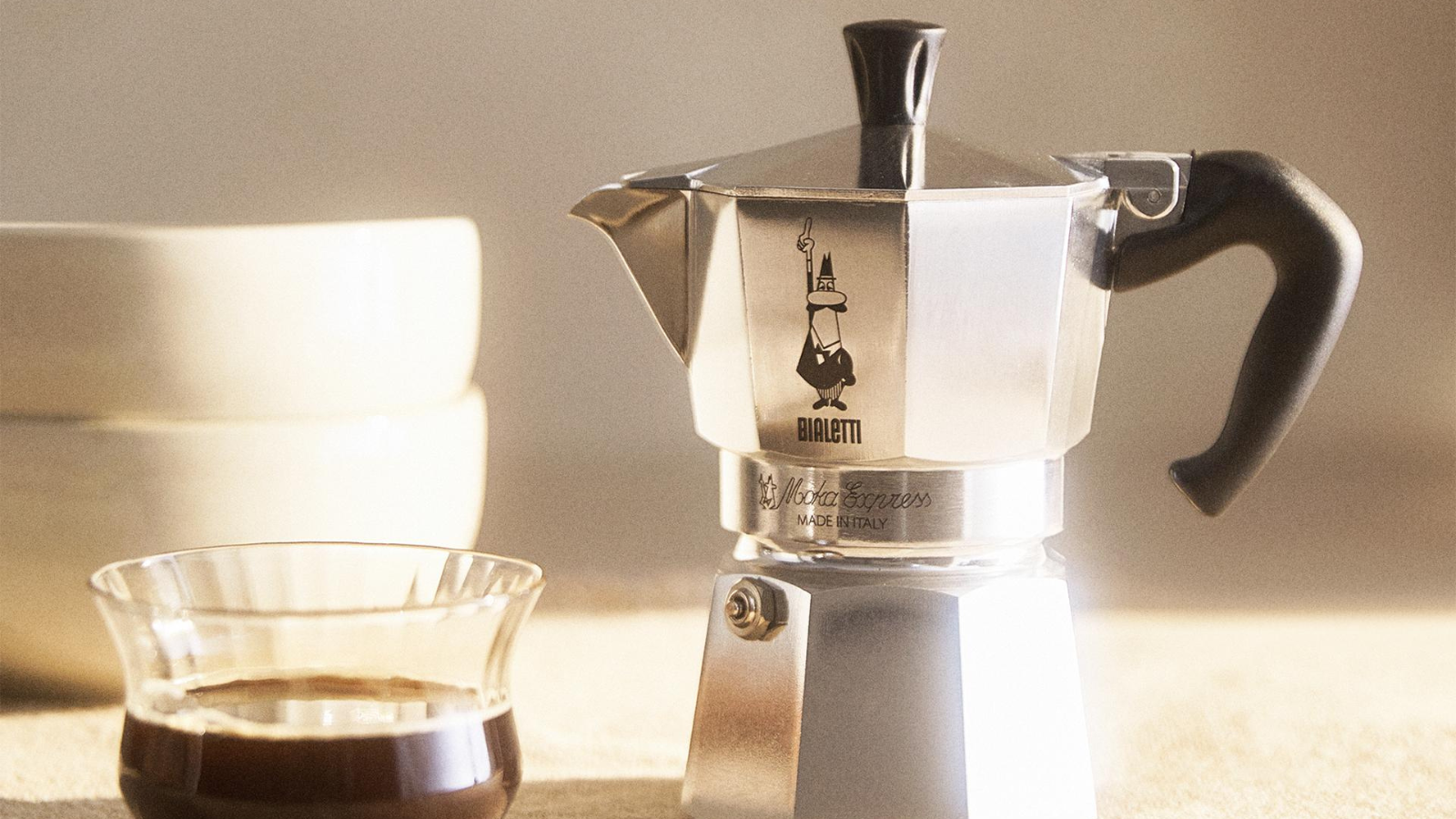
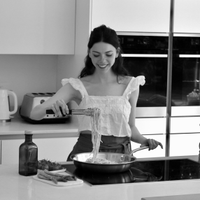
I once read a line in my favorite Italian cookbook: 'At the bar, we drink espresso. At home, we make moka.' After traveling across Italy – from Florence to Naples – I discovered how true that is. Step into nearly any Italian kitchen, and you’ll find a moka pot perched on the stovetop, usually a trusty Bialetti, patiently waiting to brew the next cup of rich, velvety coffee.
After extensive testing, I can confidently say: Bialetti reigns supreme in the world of moka pots. The iconic Moka Express remains unbeaten, both in performance and charm (I have a soft spot for the little handlebar-mustached logo – a tribute to Renato Bialetti, the son of Alfonso, who invented the first moka pot in 1933).
But while Bialetti is the gold standard, it's not the only player in the game. Other brands might better suit your specific needs or lifestyle. That’s why we’ve curated a list of the best moka pots on the market, each rigorously researched and tested to help you find your perfect match.
When choosing the best moka pots, I focus on premium materials, ease of use, stove compatibility, thoughtful design, capacity, and, of course, the ability to brew a cup with a rich, flavorful intensity that rivals the best espresso machines.
These are my top six picks, but no matter which you choose, you'll be in good company, brewing your coffee the authentic, Italian way.
The quick list
Here's a very quick introduction to our favorite moka pots. We'll go into more detail further down.
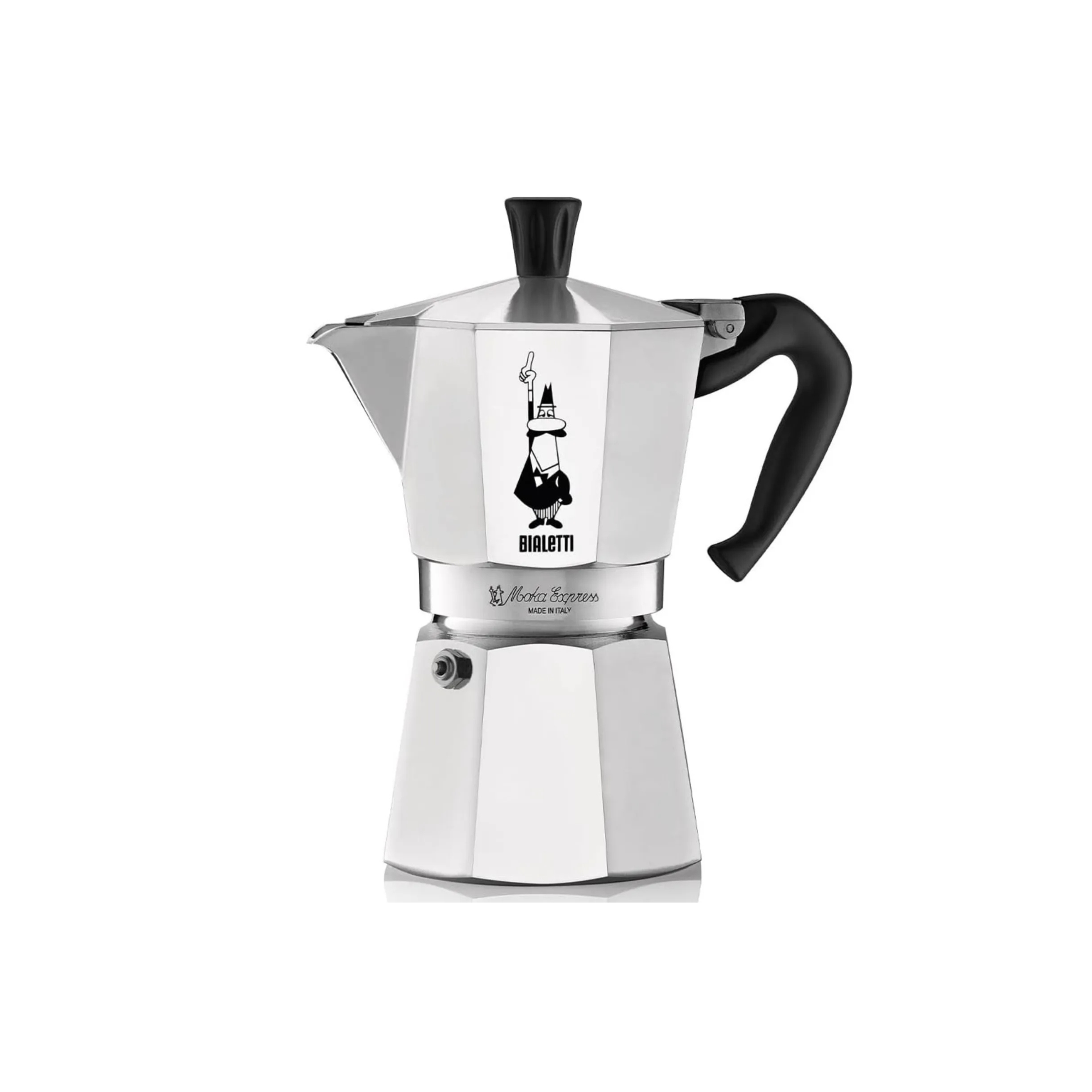
This is the number one in so many ways: it's the first moka pot design, made by the first moka pot makers, and it's the best in all moka pot buying guides. However, it won't work on induction stoves.
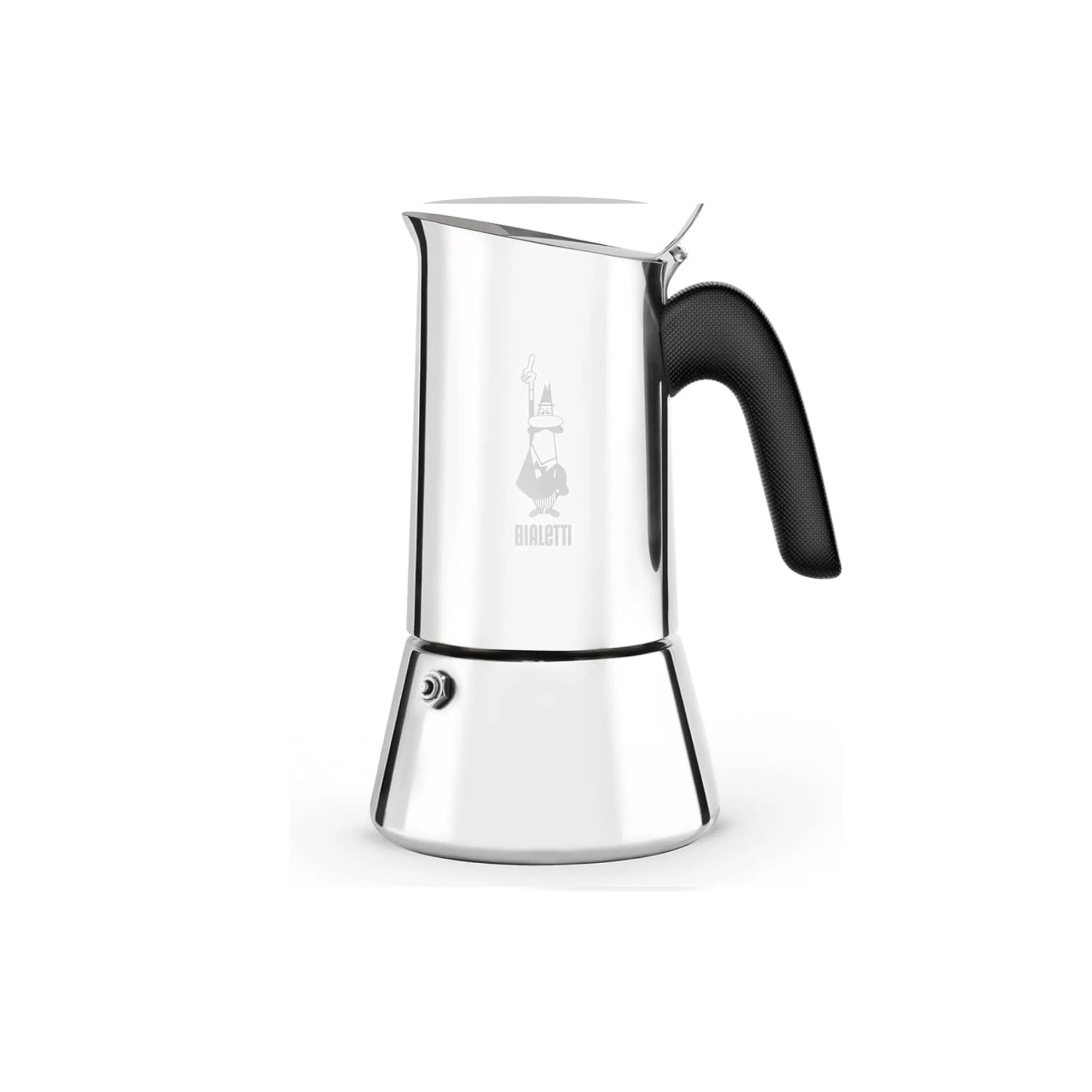
Crafted from stainless steel, instead of aluminium, this moka pot works on both gas and induction stoves. It's also the quickest option we tested, but it doesn't have the iconic, traditional moka pot design.
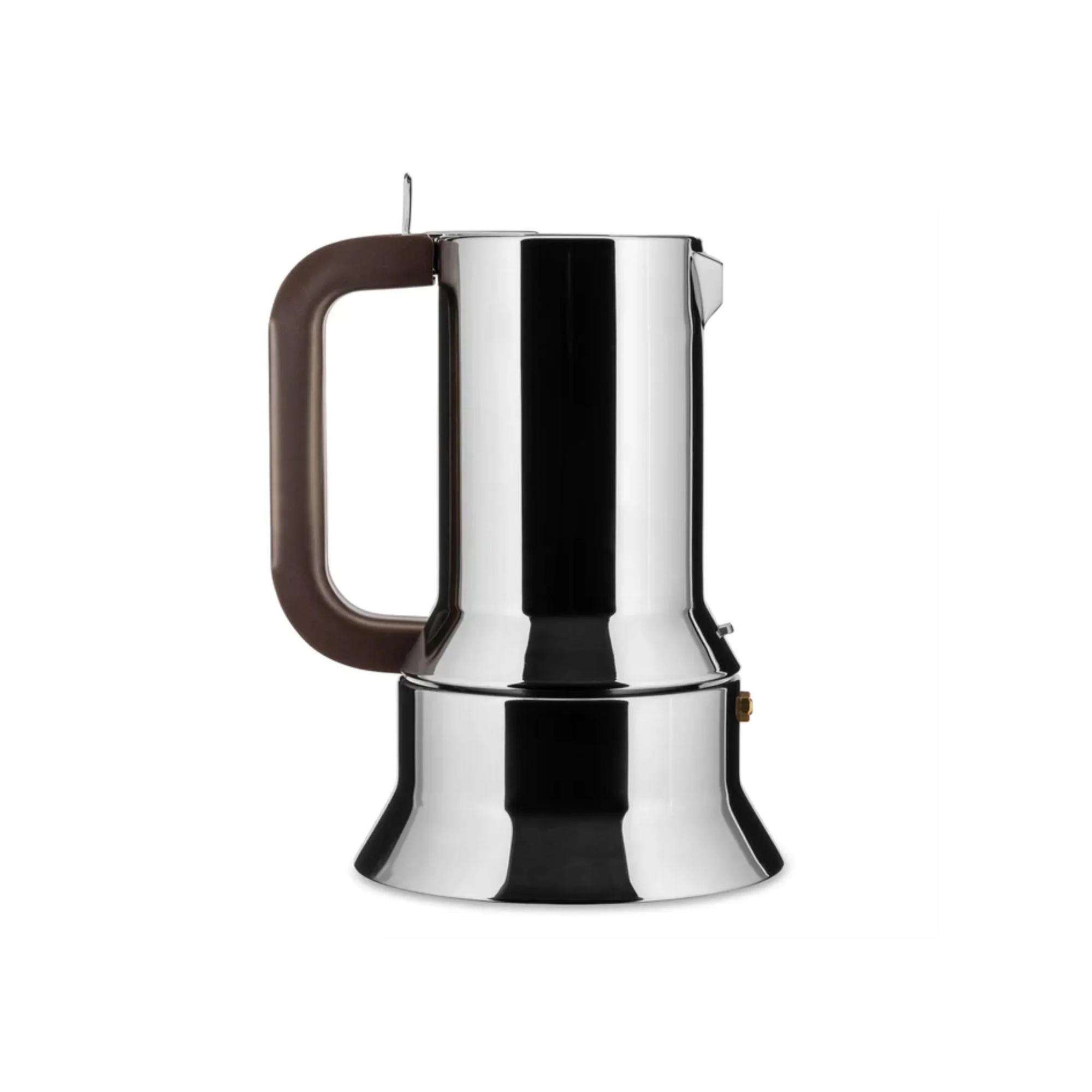
This sleek, modern moka pot can serve ten cups of consistent, rich and flavorful coffee. However, the premium stainless steel craftsmanship comes at a very high price.
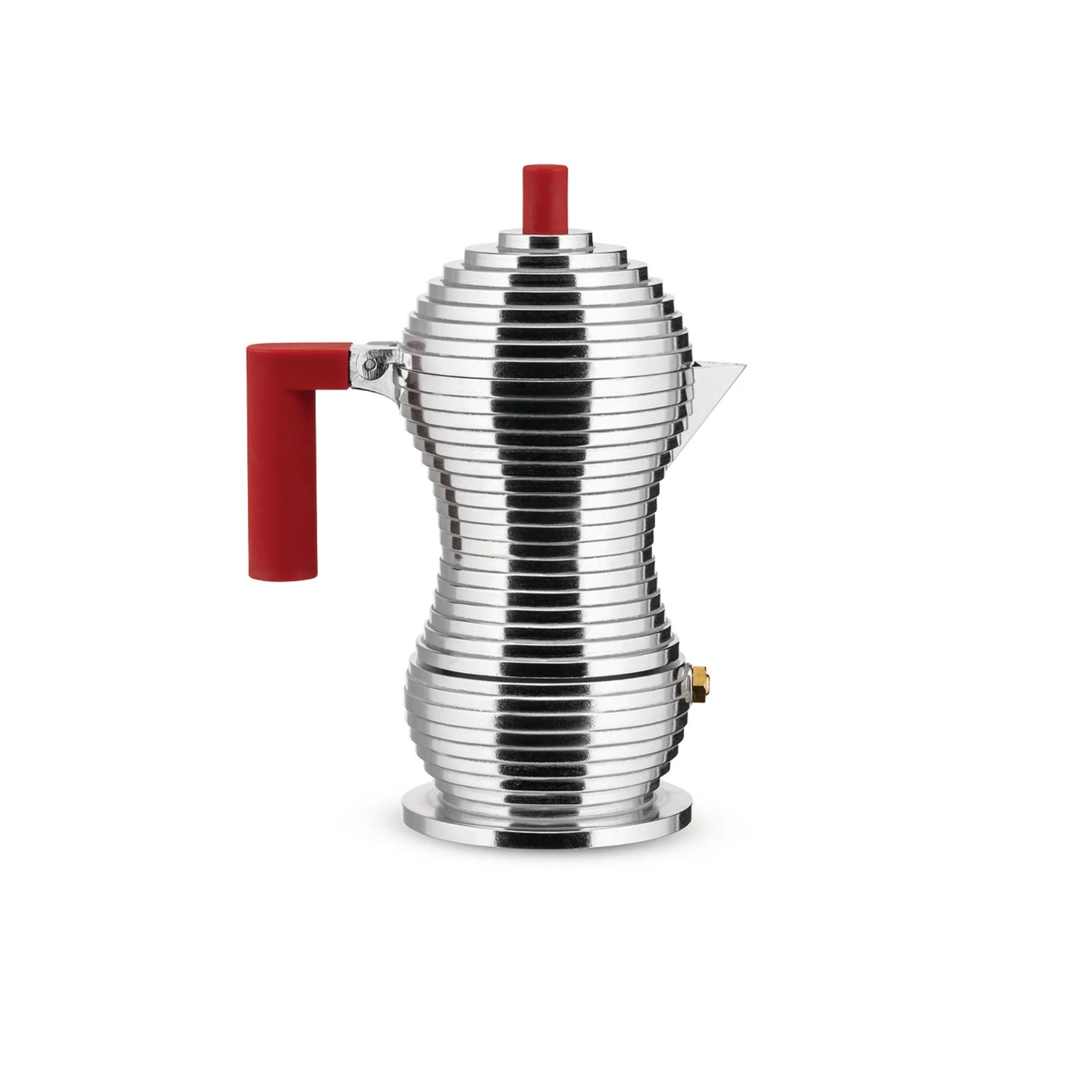
With a unique hourglass chamber, red handle, and cute spout that prevents drips, the Pulcina unites form and functionality. The coffee is well-balanced, but the exterior grooves can be tricky to clean.
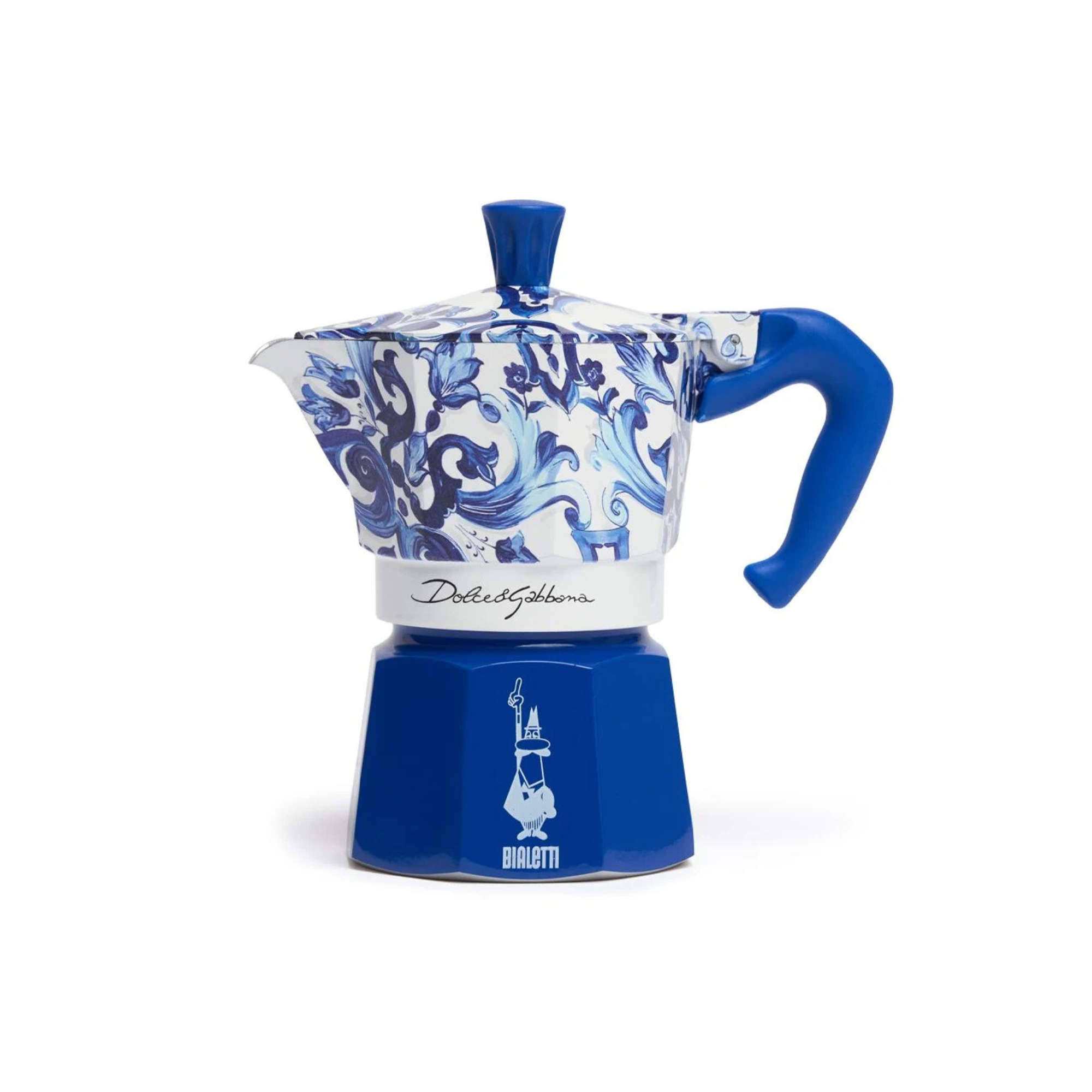
This is what happens when luxury Italian fashion meets premium Italian coffee – it's of course beautiful. For delicious, designer coffee, look no further.
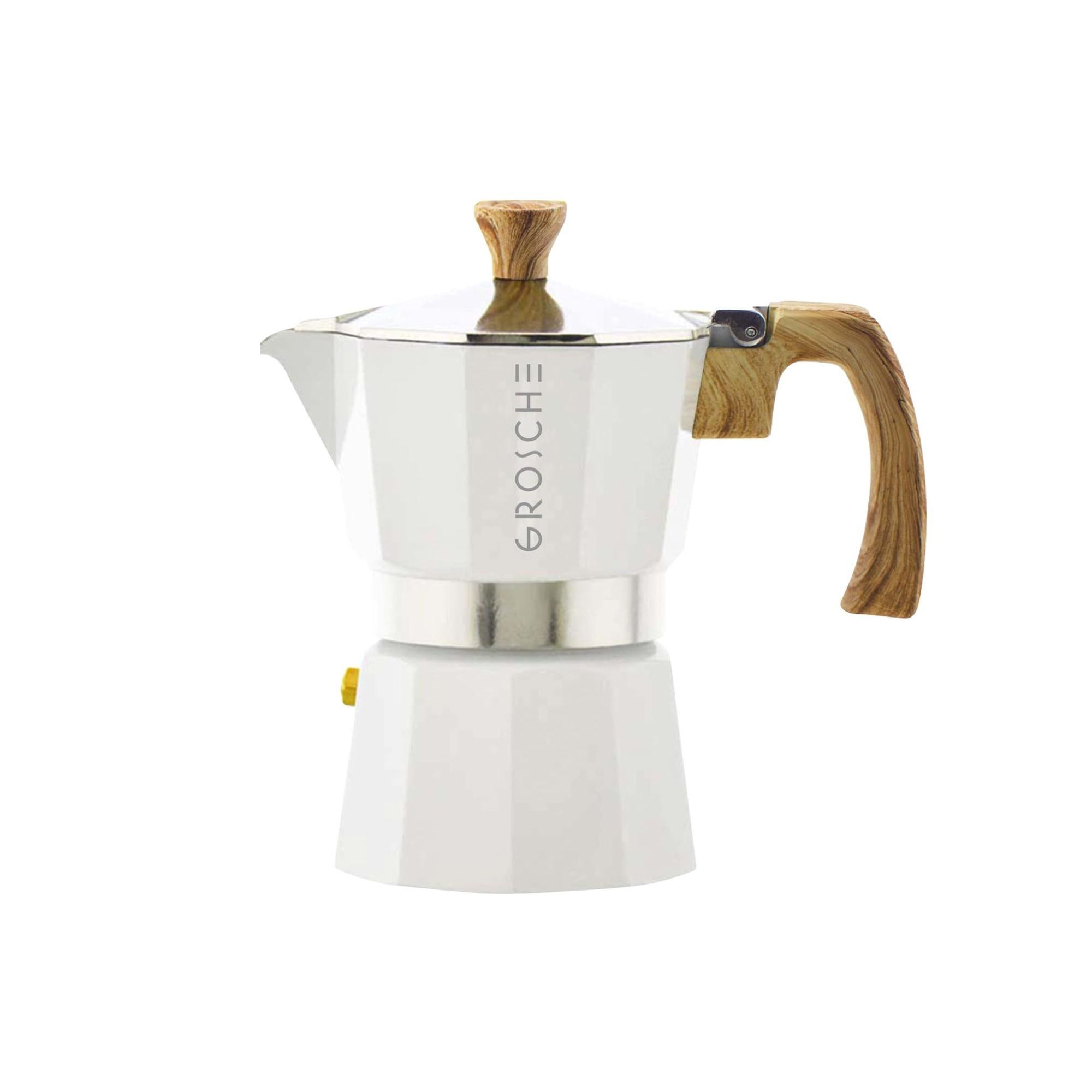
The Grosche comes in a range of colorful finishes with a comfortable wood-style handle. The small filter basket means that it brews weaker coffee, but it's under $40.
The best moka pots we recommend in 2025
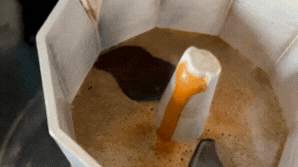
The best moka pot overall
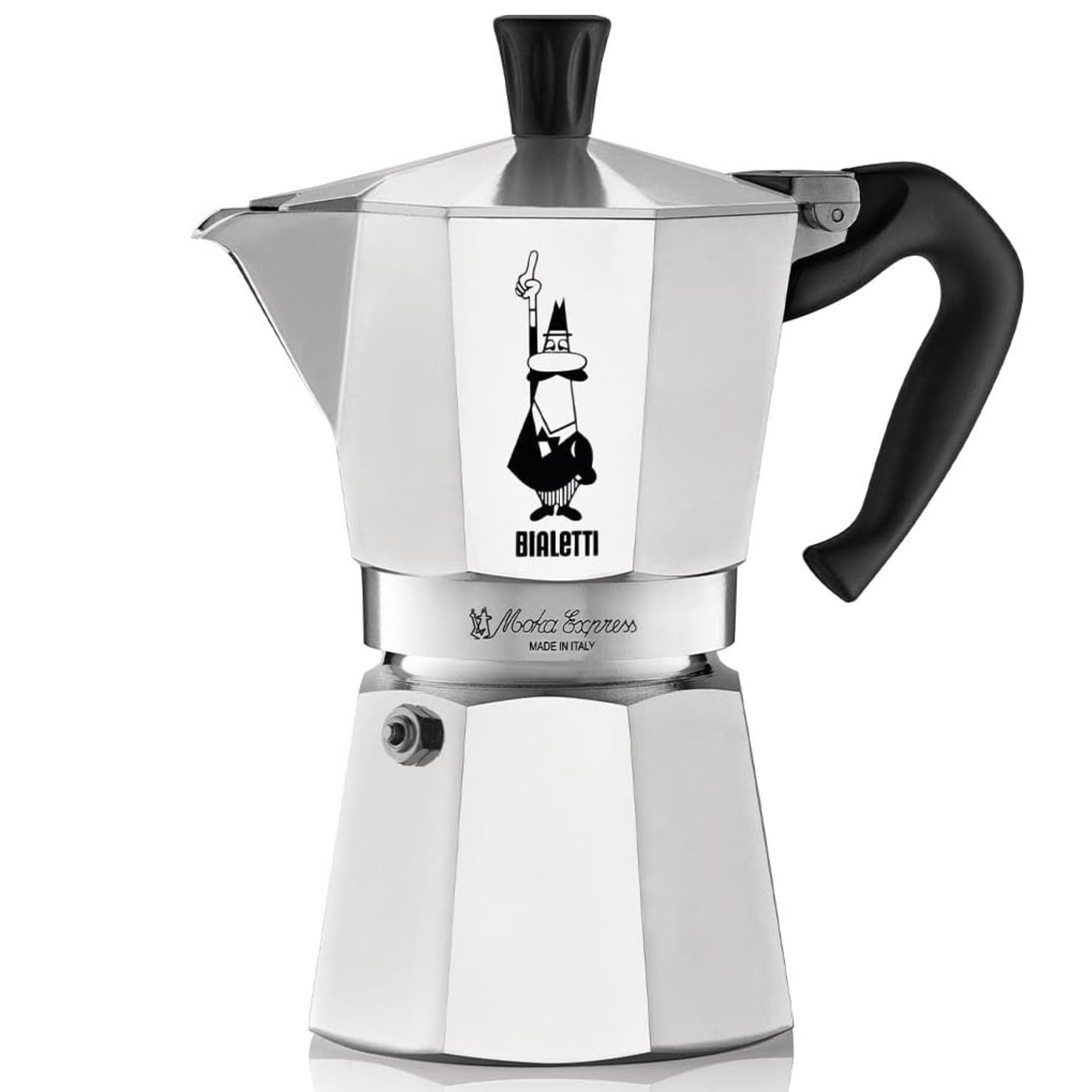
1. Bialetti Moka Express
This is the best of the best, no debates needed.
Capacity: 1-12 cup | Material: Aluminium | Induction compatible: No
Why it’s the best: If you’ve ever used a moka pot, chances are it was the Bialetti Moka Express. This coffee maker isn’t just a classic – it’s practically its own category. The signature design, with the octagonal base, funnel strainer, angular pitcher, and hinged lid, set the standard for all moka pots that followed.
The Moka Express is beloved for its simplicity. It screws together effortlessly, making it easy for anyone to use, even if you’re new to moka pots. It reliably produces rich, full-bodied coffee, and its lightweight aluminum construction makes it easy to handle and store. The timeless design adds a stylish touch to any countertop.
Given its reputation and performance, you might expect it to come with a hefty price tag, yet, it remains one of the most affordable options on the market. Outstanding value for such a well-crafted product.
What we didn’t like: One drawback of the Moka Express is that it isn’t compatible with induction stoves. If you need an induction-friendly option, Bialetti's Venus offers similar performance.
Also, the aluminum construction, while lightweight and efficient, doesn’t retain heat well, so your coffee will cool quickly if you don't want to drink it immediately. The handle can also get warm during brewing, so it’s worth being cautious when pouring.
Who would it suit? If you’re new to moka pots, the Bialetti Moka Express is a perfect choice. Its straightforward design and foolproof operation mean you can’t go wrong. While it's not as speedy as an automatic espresso machine, it's very quick for a moka pot – it brews a strong, rich carafe of coffee in under ten minutes.
There is a range of sizes available for everybody; the six-cup model is particularly well-suited to families.
The best moka pot for induction stoves
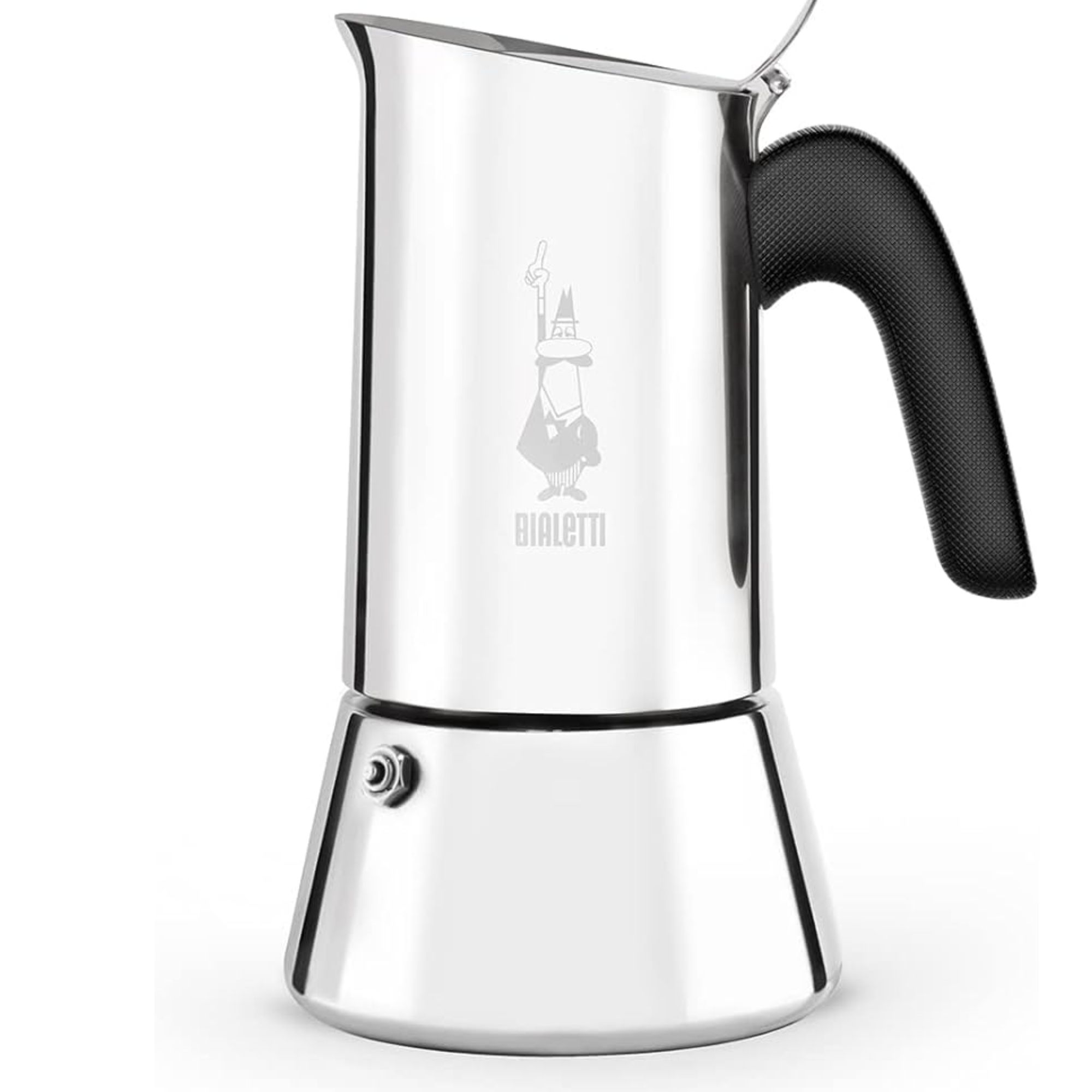
2. Bialetti Venus
A speedy, stainless steel model for modern stoves
Capacity: 4-10 cups | Material: Stainless steel | Induction compatible: Yes
Why it’s great: Unlike traditional moka pots made from aluminum, the Bialetti Venus is crafted from stainless steel. While stainless steel is heavier and requires some polishing to keep it looking smart, it’s more durable and fully compatible with induction stoves.
In our tests, we actually found that the stainless steel construction retains heat better too, keeping your coffee warmer for longer. The flavor was also great. The Venus delivers the same rich, bold, and full-bodied coffee you’d expect from any Bialetti moka pot.
What we didn't like: I have to admit, I miss the retro aesthetics of the classic moka pot. The Venus is more of a spherical oblong. Plus, the different build style means that the gasket is sealed with silicone, which needs to be replaced every year to ensure reliability.
Who would it suit: If you have a modern kitchen with an induction hob, this is the model for you. It's important to note that, whilst this comes in every size between 2 and 10 cups, the two-cup model isn't induction stove-friendly. If you're looking for a very speedy moka pot, this brewed coffee about a minute faster than the Moka Express in our tests.
The best large moka pot
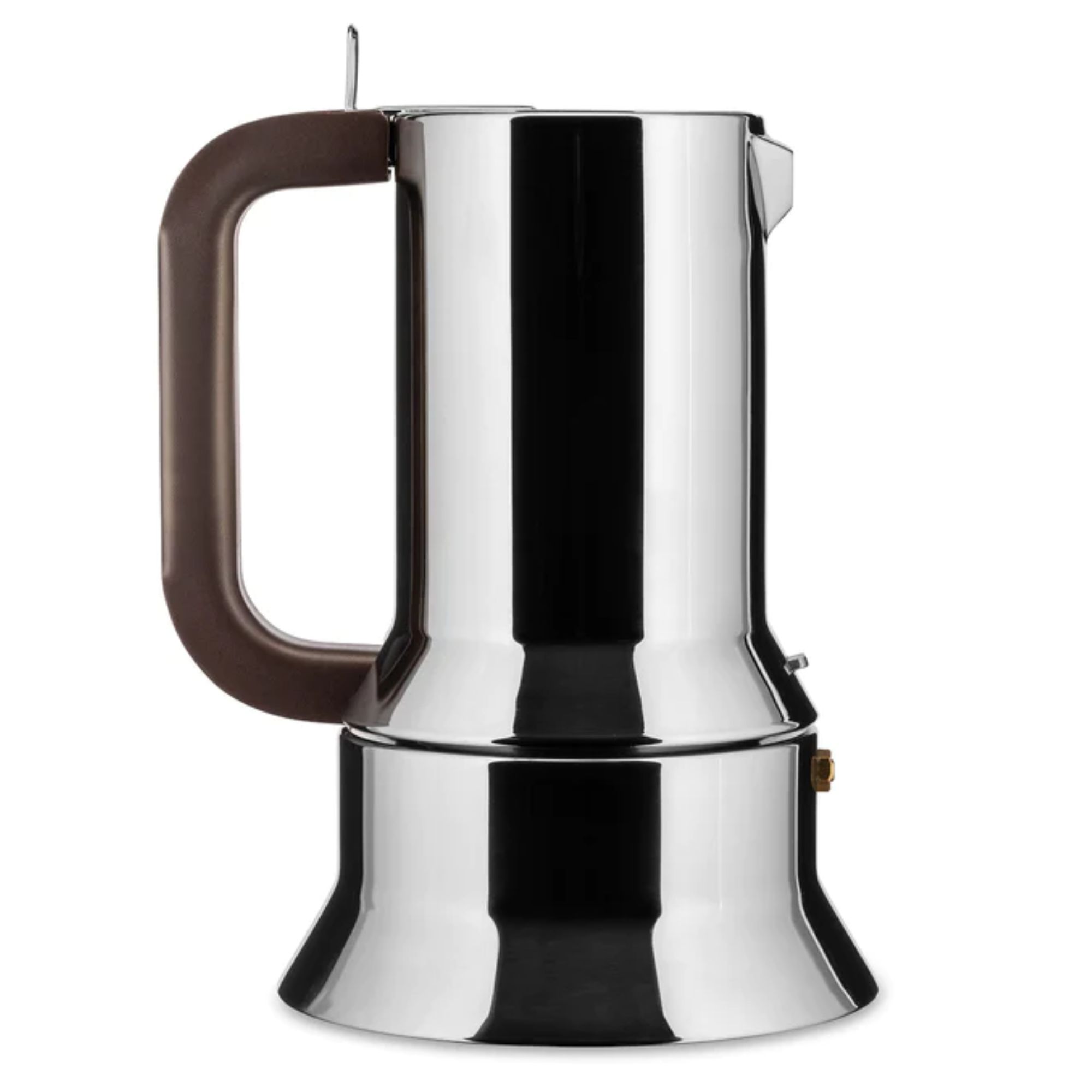
3. Alessi 9090
A challenge to the classic this can handle single-serves up to ten cups
Capacity: 1-10 cups | Material: Stainless steel | Induction compatible: Yes
Why it's great: Firstly, it's crafted from 18/10 stainless steel, so feels like its made to last for an entire lifetime. Customer reviews also commented on this, saying that it feels like the most robust moka pot on the market. I loved how it feels to hold and pour from. With a magnetic steel bottom, this is also suitable for using on induction stoves as well as on your gas stove, so wherever you are, you know you can take your moka pot with you and have great coffee guaranteed.
Whilst all moka pots come in a range of sizes, the 9090 is particularly versatile. They offer single-serve models right through to ones with ten cup capacities. It's true, some brands make even bigger sizes, but the Alessi is able to keep its performance and efficiency at the large size – which can be hard to come by. The coffee takes a couple more minutes to brew, but tastes delicious and smooth once ready.
I also spotted something which has rarely happened in my history of researching for reviews before. People started talking about how they feel using the 9090. Multiple customer reviews described feeling 'cool', 'put-together', and 'cosmopolitan' for simply using the 9090. It's clearly a lifestyle investment.
What we didn't like: However, the 9090 has a few drawbacks. The top of the 9090 is tall and narrow, making it hard to reach deep inside for deep cleaning. It's also heavier than Bialetti's models; you might not want to opt for a heavier model if you struggle with your wrists, but it is still very easy to pour from.
This is also the most expensive moka pot on the market. It costs over ten times some other models on this list, which is a lot to pay for a few cups of coffee.
Who would this suit? Anyone who needs a lot of coffee – or anyone with an eye for design. Each Alessi Moka pot holds on to some simple, traditional aspects of the moka pot, but changes another aspect, culminating in some seriously stunning designs – you should check out the entire range. While I love the avant-garde design of the Alessi Pulchina, available at Amazon, I prefer the 9090.
Best moka pot design

4. Alessi Pulcina
A unique design that is sure to start kitchen conversations
Capacity: 3 or 6 cups | Material: Aluminium | Induction compatible: Yes
Why it's great: Unlike traditional moka pots, the Pulcina has a bold, sculptural design that looks like something from the MoMA. I love the striking red handle, hourglass body and pleated grooves. But its beauty isn’t just aesthetic – it is designed to make rich, flavorful coffee without bitterness.
The unique, curvy chamber stops the flow at just the right moment for a smoother, more balanced cup. In my tests, each cup was rich and never burnt. The beak-like spout (hence the name Pulcina, which means 'chick' in Italian) is designed to prevent drips and dribbles.
What we didn’t like: While the Pulcina brews delicious coffee, the exterior grooves makes it slightly harder to clean and polish, in comparison to a classic Bialetti. The handle placement can also get a bit warm, so you have to be careful when pouring. Lastly, it’s more expensive than standard moka pots, so you’re paying a premium for the design.
Who would it suit? This is for design lovers, moka purists, and anyone who appreciates functional beauty. If you’re looking for a moka pot that elevates both your coffee routine and your kitchen aesthetic, the Pulcina is hard to beat. However, if you’re after pure practicality, the Bialetti Express or the budget Grosche model below will be the better choice.
The best luxury moka pot

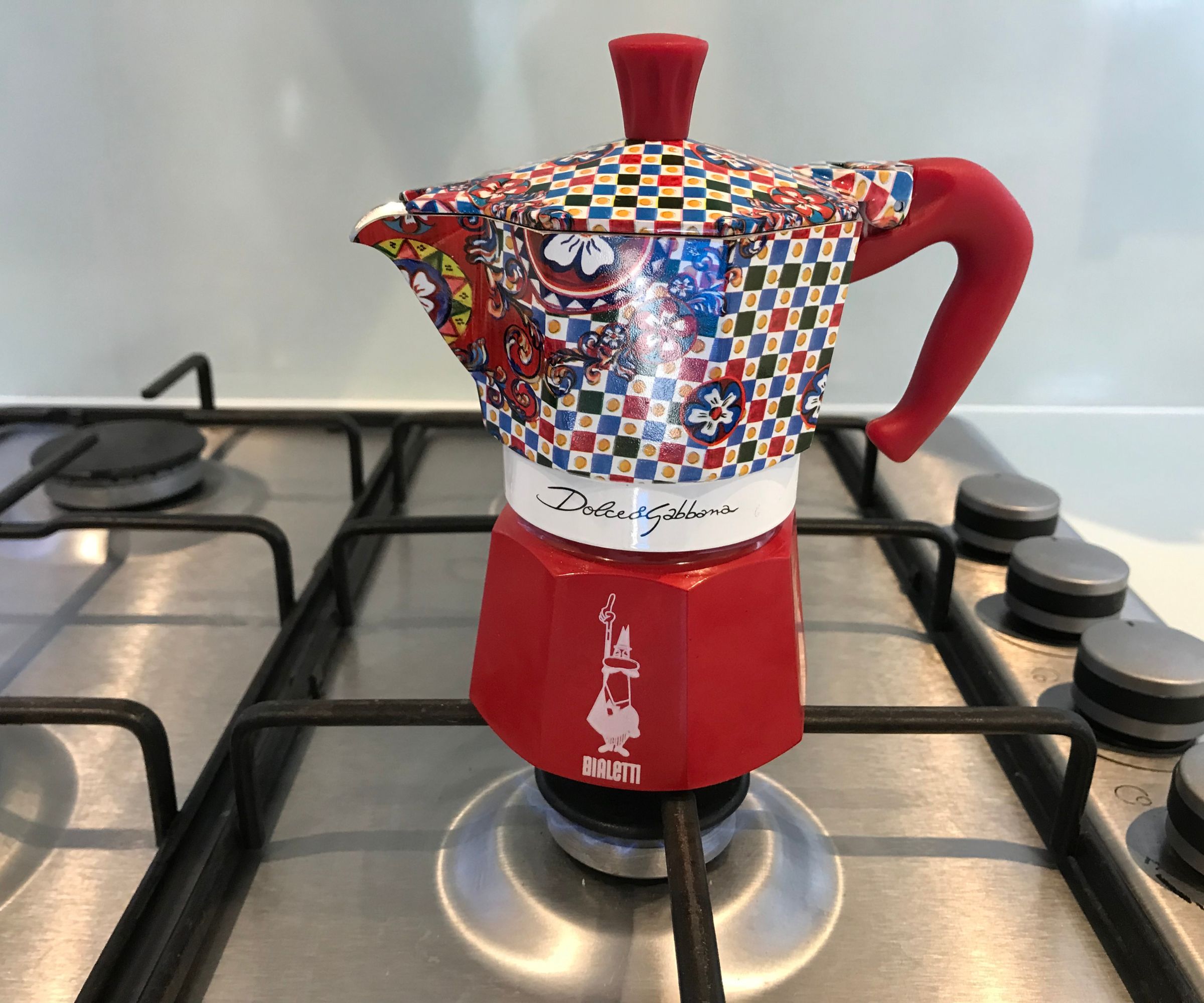
5. Bialetti X Dolce & Gabbana Moka Express
A true statement piece, this is almost too beautiful to use
Capacity: 3 or 6 cups | Material: Aluminium | Induction compatible: No
Why it's great: This moka pot is simply stunning. There are two Dolce & Gabbana designs to choose from: a rich red or Mediterranean blue, inspired by the Sicilian seaside views. Our tester, Laura, tested the red colorway and she says: 'Before testing this, I thought they might look gaudy. I actually hoped they would, because maybe it would make me want to buy this a little less. Spoiler alert: they don't. The colors are beautiful. If I didn't love it so much, I would hate it for being so irresistible.'
Who does it suit? Anyone who values style and simplicity. Dolce & Gabbana really brought the style factor and, as you can expect, Bialetti brought the taste. This is as easy to use as Bialetti's best Moka Express. Everything screws perfectly into place, it's quick to boil, and we made some deliciously thick, smooth, and rich coffee in it. One of our testers, Alex, bought Dolce & Gabbana's specialty branded coffee, available at Macy's for some of our tests, and we all loved it. It comes in a beautiful tin and has incredible notes of hazelnut and chocolate.
What we didn't like: It's not ideal if you want a range of capacity options: this is only available as a three or six cup model. Also, if you have a neutral kitchen: the bright colours might not suit you. If you've ever heard of the unexpected red theory, this is your perfect piece for it. However, if you want pure function, you're paying a pointless premium for some very pretty decoration.
We also found the handle gets quite hot by the end of brewing. While the thermoplastic stays manageable, it’s not the most comfortable to grip – both due to the heat and its less-than-tactile feel.
You can read more in Laura's full Bialetti x Dolce & Gabanna Moka Pot review.
The best budget moka pot

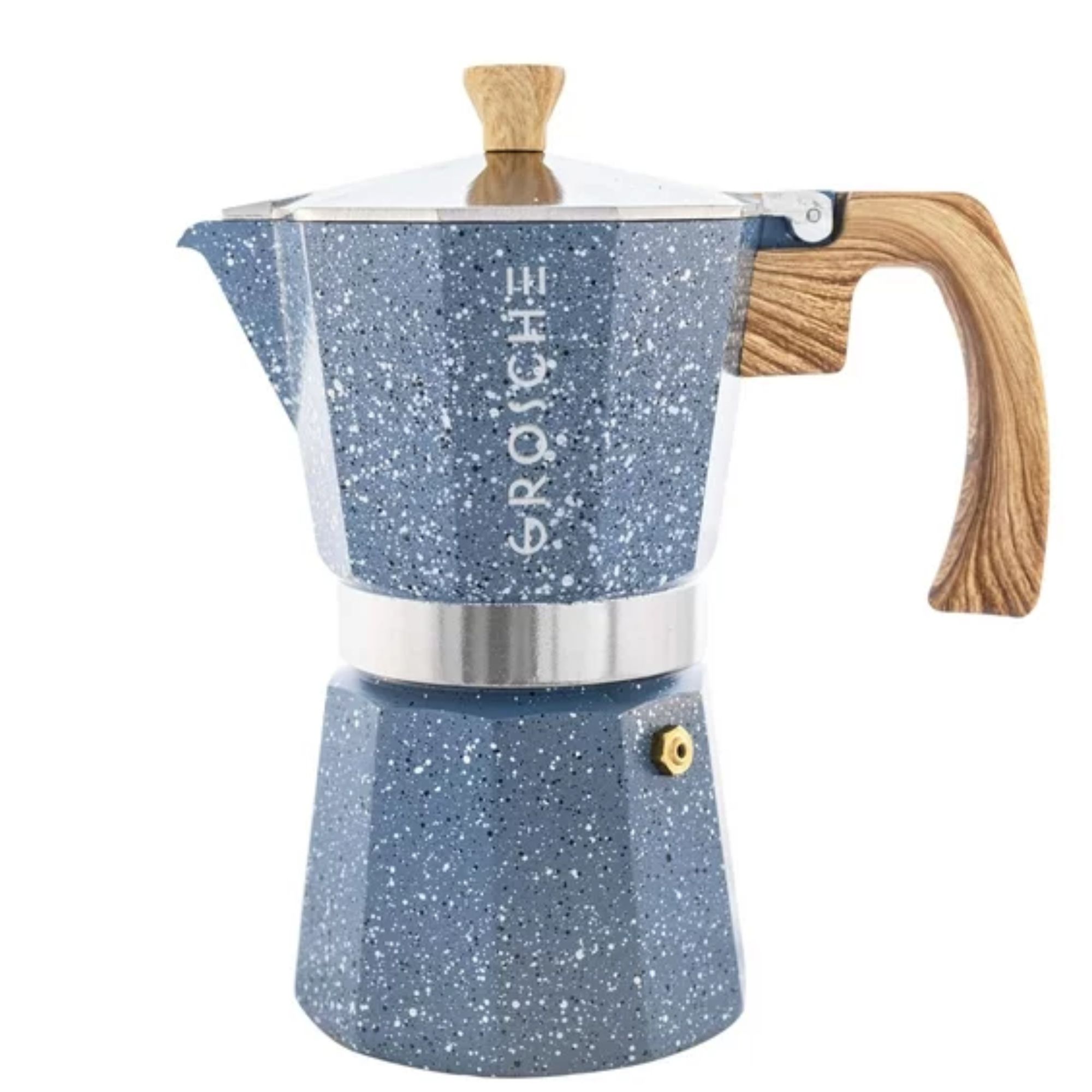
6. Grosche Milano
A chic but budget-friendly pick
Capacity: 3-12 cups | Material: Stone enamel and aluminium | Induction compatible: No
Why we love it: If you've been looking at moka pots, you'll know that Grosche is one of the big three, alongside Bialetti and Alessi. The Milano is their bestselling model, with a range of popular colors to add personality to your kitchen.
While the handle has a wooden appearance, one Amazon reviewer described it as feeling 'firmly microfibery' – and it's much more comfortable to hold than the other models we tested. Aside from design, the coffee is rich and smooth, although it doesn't quite beat the Bialetti in my opinion.
Who it would suit: If you love colorful, well-designed kitchenware with a premium feel but don't want to overspend, the Grosche Milano is a fantastic choice. It delivers the style and quality of high-end brands at a budget-friendly price, although the Bialetti Express isn't much more expensive if you want the best of the best.
What we didn't like: Taste-wise, Grosche filter baskets are smaller than Bialetti's. This means that their coffees always taste weaker. For some, this is fine, or better than having an intense espresso-like cup of coffee, but if you like thick, rich, moka pot coffee, you might feel like this slightly misses the mark.
How to choose the ideal moka pot
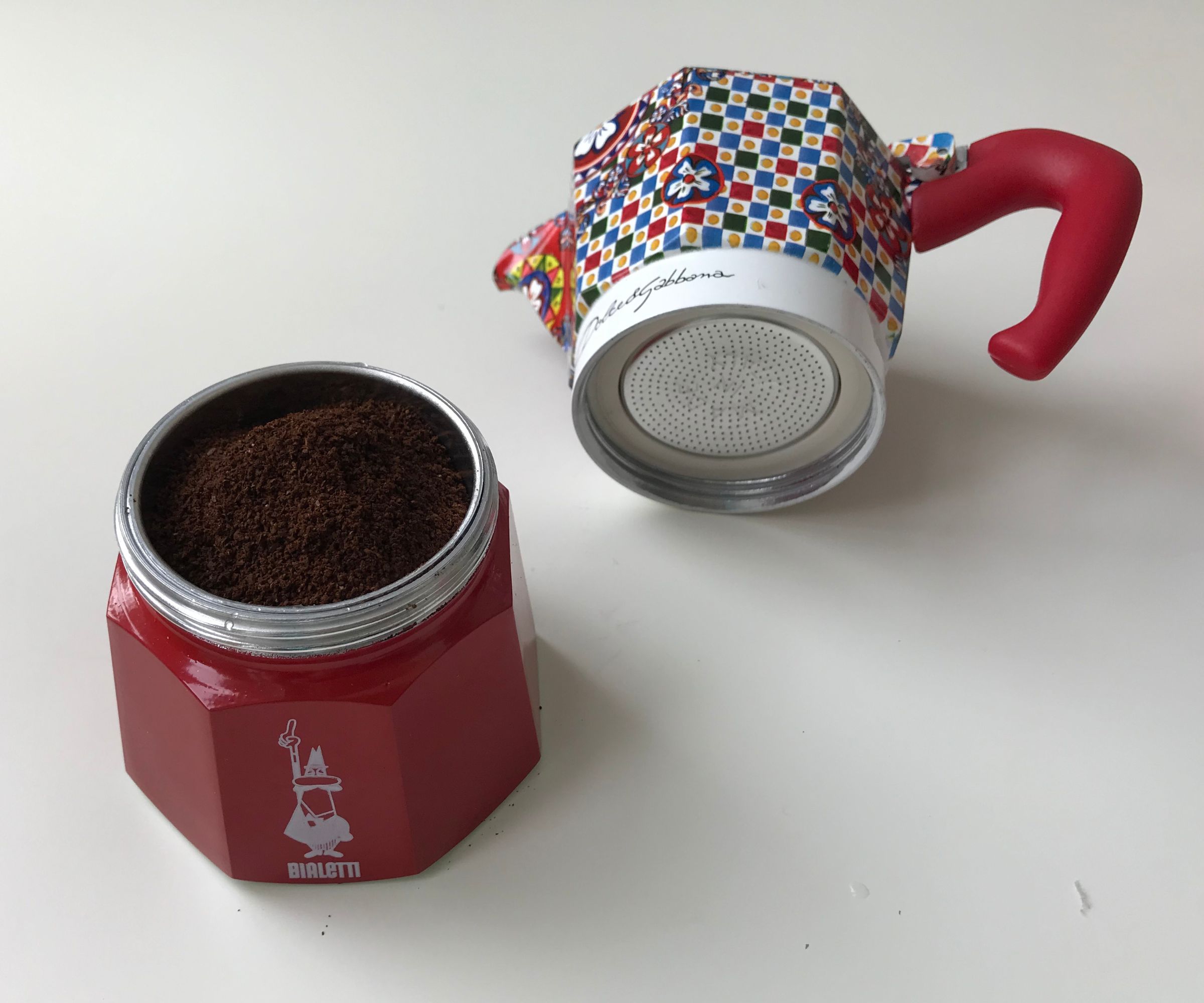
You can't go wrong with any of these moka pots. However, as with any coffee maker, there are always factors that are important to consider, such as the size, aesthetics, and price. For moka pots, these are some more factors to take into account:
Materials: Most moka pots are made of aluminum, because it's lightweight and quick to heat up, whilst being relatively durable. However, these aren't compatible with an induction stove and won't keep your coffee warm. If you have an induction stove, opting for a stainless steel moka pot will be much more suitable to your needs. There are also some which have tactile, stone finishes on the outside.
Stove Compatibility: As I mentioned, some moka pots work well on gas, whereas others are designed to work with induction stoves too. There are even models which can work completely automatically, so you won't need either. Depending on your home set-up and how often you travel, you'll want to choose an appropriate moka pot.
Capacity: This feels like an obvious one to consider, but so many people don't think about it. If you'll only be making single servings, it makes sense to buy a one or two cup moka pot. If you know you've got a whole family to caffeinate, or you'll be hosting coffee mornings, a ten cup capacity moka pot will be a much better bet.
Style & aesthetics: You've got to think about design, especially if you want to keep your pot on the stovetop. All of these are beautiful, but they come in all styles and shapes. There's the classic, octagonal, silver style, or a more modern matte black, or even, taking a leaf out of Dolce & Gabbana's book, a brightly colored and patterned design.
Price: You can pick up a good Bialetti for less than $40, but the Alessi models will cost up to $400. This isn't proportional, because the Bialetti is still the best moka pot on the market, but there are some extra features or design draws you might want to invest in.
How we tested and researched the best moka pots
When we test moka pots, we have a series of standardized tests and assessments that we put each model through. First, we'll assess the aesthetics, dimensions, and feel of the moka pot. There's no underestimating the difference that a neatly screwing gasket or stunning silhouette can make to how you perceive a moka pot.
Next, we measure the speed of the brew. Not all moka pots are made equally; some are quicker than others.
Then, we deep dive into the taste tests (my favorite part). Depending on the capacity of a moka pot, we'll test each number of cups that it can make, measuring out 1.5 tbsp of coffee (ground medium fine) and 6 fl oz of water. We'll time how long a moka pot takes to properly percolate and boil into the upper section and then measure how hot the coffee is in the upper section of the pot. We're looking for the moka pot to reach about 200°F, but we also want our coffee to taste thick and rich. It should be the most similar in flavor profile to an espresso, since that is the kind of coffee that moka pots are well known for.
To examine durability and reliability, we do as much research as we can. That way, we can supplement our tests with real life customer experience. I've read through hundreds of customer and expert reviews cross-checking every boast made by a brand and every claim or complaint made by customers. That means that this guide is a comprehensive summary of everything you need to know about the best moka pots on the market. If you want to find out more, we have a whole page dedicated to how we test coffee makers.
Who tested these moka pots

Lydia is a trained cook, who loves coffee. She's attended masterclasses at Illy's University of Coffee to learn what a delicious brew tastes like and even shadowed a barista to learn how to make every kind of coffee order. Plus, her partner is a trained barista with very exacting standards. Lydia tested the top moka pot brands in her kitchen at home to make sure they're easy to use, well-designed, and ideal for everyday use.
FAQS
Why is it called a moka pot?
I love this question. The moka pot is named after the city of Mocha in Yemen, historically one of the most important coffee trade centers in the world. Mocha was famous for its rich, aromatic coffee beans, which were exported to Europe and the Middle East as early as the 15th century.
When the Italian inventor Alfonso Bialetti created the moka pot in 1933, he named it in homage to this legendary coffee city. His invention, the Moka Express (still going strong today!) was designed to brew a strong, rich coffee that resembled the flavor of traditional espresso, but it could be easily made at home without the need for a complex espresso machine.
How do you use a moka pot?
It’s easier than you might imagine. I’ve been making moka for years, but recently, I learned some expert tips at the illycaffè University of Coffee in London. Elena Comanici, Quality & Training Manager at illy, has shared the best ritual below:
1. Fill the base with cold water up to the level of the valve (never fill above the valve) and insert the filter.
2. Fill the filter to the top with ground coffee, do not press the powder down, but level it off with the handle of a spoon.
3. Make sure the filter and rubber seal are correctly in place. Screw the two parts of the moka together tightly.
4. Put the moka on the stove on a low heat.
5. Take the moka off the heat as soon as the flow of coffee from the column covers the bottom of the extraction chamber, before it starts to gurgle. This ensures that only the best substances in the coffee are extracted.
6. Stir the coffee with a spoon before pouring it into the cups.
7. Enjoy!
Design expertise in your inbox – from inspiring decorating ideas and beautiful celebrity homes to practical gardening advice and shopping round-ups.
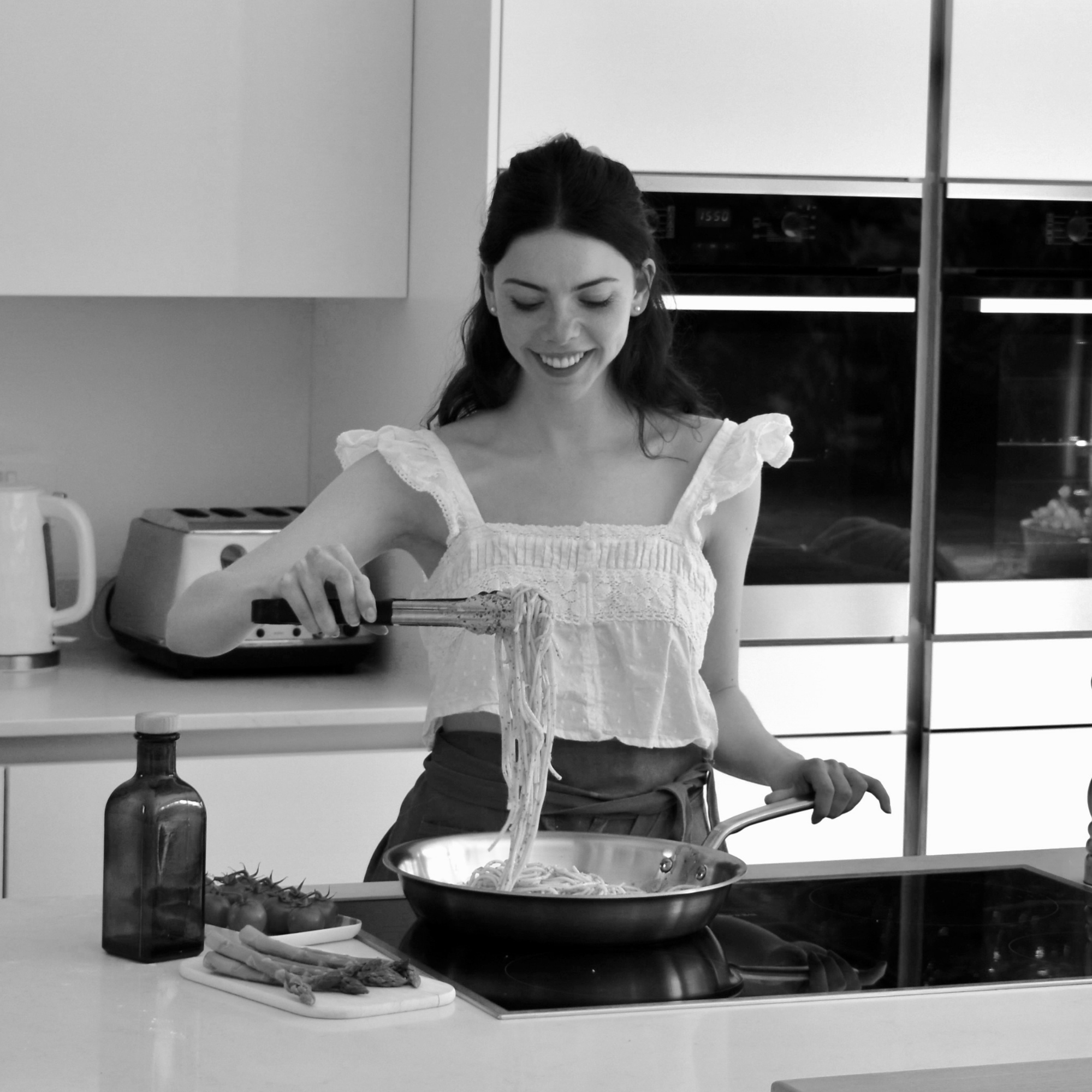
Lydia is the Kitchen Appliances Editor for Homes & Gardens, testing everything from air fryers and mixers to juicers and coffee machines. She trained in Culinary Arts at Leiths School of Food & Wine and previously served as the Recipe Editor for Mindful Chef.